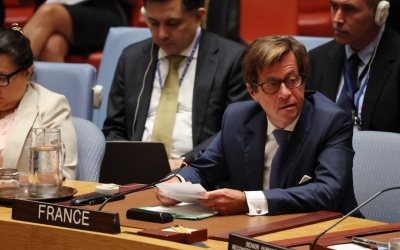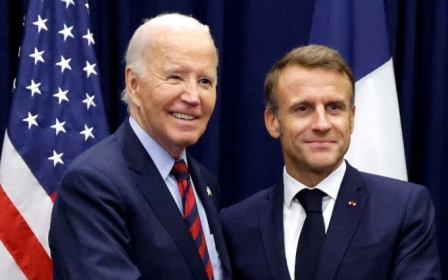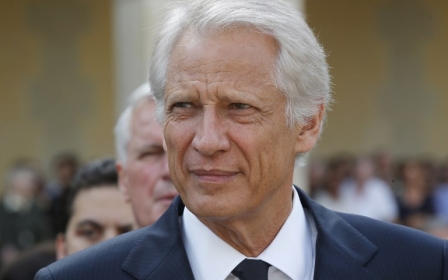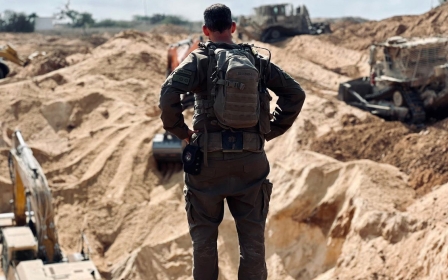Israel's war on Lebanon: Can France stop the bloodshed?
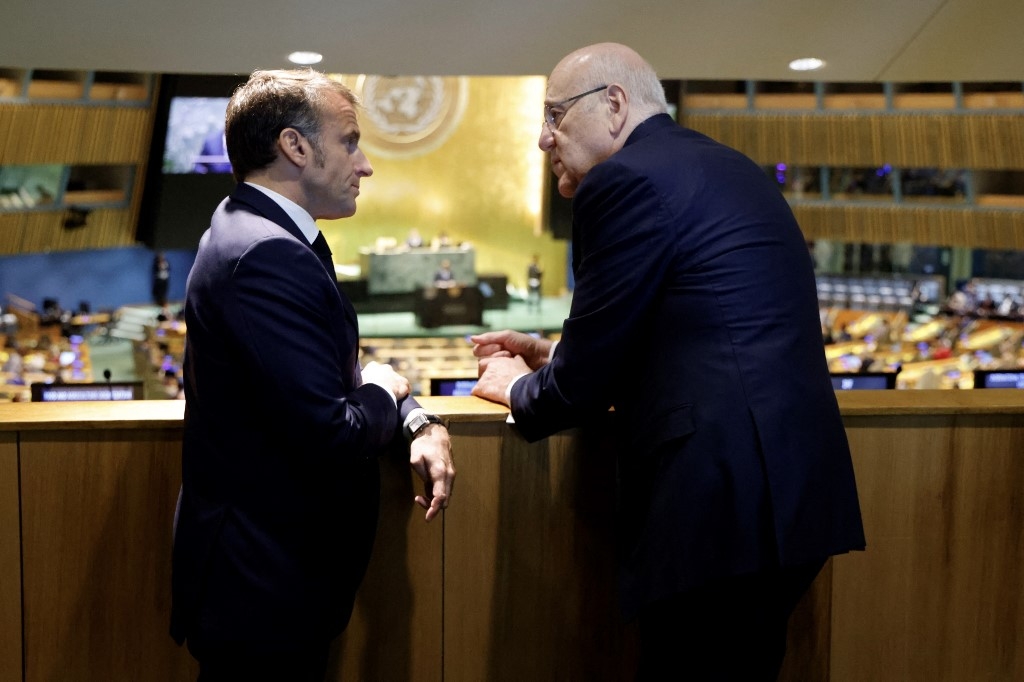
For decades, France has considered Lebanon a "brotherly country", with the two nations maintaining strong ties since the end of the French mandate in 1946.
Paris has made several attempts to resolve some of the various crises that Lebanon has faced, all while grappling with its colonial heritage in the country.
Since the outbreak of Israel's war on Lebanon in September, France has stepped in to mediate a resolution, but calls from French officials for Israeli Prime Minister Benyamin Netanyahu to show "restraint" have fallen short.
On Monday, Jean-Noel Barrot, France's foreign affairs minister, became the first representative of a Western nation to visit Lebanon since Israel began its bombing campaign and issued evacuation orders in certain areas, displacing 1.2 million people, according to governmental figures.
"I want to address a message of support and solidarity to the Lebanese people," said the French minister during his visit to Beirut before urging Israel to "refrain from any ground incursion" in the country.
New MEE newsletter: Jerusalem Dispatch
Sign up to get the latest insights and analysis on Israel-Palestine, alongside Turkey Unpacked and other MEE newsletters
He also announced a €10m ($10.98m) aid package for Lebanese humanitarian organisations.
However, beyond the statements and financial aid, observers doubt the effectiveness of French efforts.
For Ziad Majed, a French-Lebanese professor at the American University of Paris and a specialist in Middle East politics, there is a "gap" between France’s statements and the lack of concrete measures that could be undertaken.
"France evoked on many occasions the necessity of protecting Lebanon, and the visit of the foreign affairs minister also reflects a certain desire on the French side to play a role in Lebanon," Majed told Middle East Eye.
"But between diplomatic desires and reality, the gap is big."
Lost leverage
Earlier last week, French President Emmanuel Macron said he opposes Lebanon "becoming a new Gaza", referencing the nearly year-long Israeli war on the Palestinian enclave, which has killed almost 42,000 people, according to the Palestinian health ministry.
Macron described the number of Lebanese civilian casualties as "absolutely shocking".
Meanwhile, Paris and Washington proposed a 21-day ceasefire plan at the United Nations, but it was publicly dismissed by Netanyahu.
Lebanese Foreign Minister Abdallah Bou Habib later declared that both Hezbollah leader Hassan Nasrallah and Netanyahu had agreed to the temporary truce just before Israel killed Nasrallah in a massive air strike in Beirut.
Since the onset of Israel’s war on Gaza and its recent assault on Lebanon, Israeli attacks killed more than 2,000 people, according to the Lebanese health ministry, including two French citizens.
'Nowadays, as there is no more France's Arab policy, France's voice has become inaudible'
- Bertrand Badie, international relations expert
Around 23,000 French currently live in Lebanon, making it the most prominent French community in the Middle East.
According to Bertrand Badie, a French author and expert on international relations, France has lost its leverage in the region since the end of "France's Arab policy" in 2003.
"From the Six-Day War in 1967, when General de Gaulle took a stance that was quite favourable to the Palestinian cause, to the Iraq War in 2003, when Jacques Chirac opposed the United States, there was a truly vibrant Arab policy," Badie told MEE, referencing Paris’ refusal to join an allied military intervention to topple Saddam Hussein.
"But this Arab policy was brutally interrupted in 2003 when President Chirac abandoned this line, impressed by the threat of American reprisals.
"From then on, France has been pretty much aligned with the American positions. Nowadays, as there is no more France’s Arab policy, France’s voice has become inaudible," Badie added.
This opinion is shared by Jean-Luc Melenchon, leader of the left-wing party France Unbowed (LFI), who said in a statement published on X last weekend: "France no longer counts on the ground [in Lebanon]. Netanyahu's crimes will continue since they are unpunished."
For Dalal Mawad, a Lebanese author and journalist, France is operating a "shift of narrative" and increasing its diplomatic initiatives because it knows that "nothing good is going to come out of dragging Lebanon into a full-blown war".
"In the past year with the war in Gaza, we have seen a clear bias from France towards Israel. But now, France is intensifying its diplomatic efforts, and there is a shift of narrative as the risk of a regional war is increasing," she told MEE.
Mawad said that while Macron took a long time to call for a ceasefire in Gaza and initially supported Israel, the French president now appears more critical.
'The French don't have the upper hand'
Analysts say that even if France has some assets to help appease the situation, its influence does not match that of the United States.
"A lot of people say that France is one of the few countries that can dialogue with Hezbollah, as it only considers the military wing of Hezbollah as a terrorist organisation, unlike other European countries and the US," Mawad explained.
Countries such as Germany and the United Kingdom, which align themselves with the United States, do not differentiate between the political and military branches of the Lebanese movement.
"The Lebanese people welcomed the French proposal at the UN. But they are also very much aware that the French don’t have the upper hand when it comes to Israel," Mawad said, pointing to the United States’ role in supporting Israel in both the war on Gaza and Lebanon.
"However, France still has trade relations with Israel and it can mobilise itself inside the European Union," she said.
Since the beginning of Israel's war on Gaza, many organisations and citizens have called on the EU to suspend its Association Agreement with Israel and implement sanctions against the country.
Last April, 11 NGOs, including Amnesty International, announced that they had filed a court case against France to halt its weapons sales to Israel.
Although Macron assured that France does not sell weapons to Israel, rights groups and investigative media have criticised the lack of transparency surrounding the issue.
According to a defence ministry report to parliament obtained by French media outlet Mediapart, France delivered €30m worth of military equipment to Israel in 2023.
However, since the report does not specify the months, Mediapart noted that it is impossible to determine whether these deliveries continued after Israel's offensive on Gaza began on 7 October, adding that the Ministry of the Armed Forces was unable to clarify the matter.
Majed also believes that France should use other means at its disposal beyond diplomacy.
"After the failure of diplomatic initiative, there is nothing that should keep the French authorities away from recognising the Palestinian state and imposing sanctions," Majed told MEE.
'After the failure of diplomatic initiative, there is nothing that should keep the French authorities away from recognising the Palestinian state and imposing sanctions'
- Ziad Majed, American University of Paris professor
In June, when asked about the possibility of France recognising the state of Palestine, following the lead of several European countries such as Spain, Norway and Ireland, Macron responded that it was not "the right solution".
"It is not reasonable to do it now. I denounce the atrocities that we see with the same indignation as the French people. But we do not recognise a state based on indignation," he added.
After Iran carried out an attack on Israel on Tuesday in retaliation for the assassinations of Nasrallah, Islamic Revolutionary Guard Corps (IRGC) commander Abbas Nilforoushan and Hamas leader Ismail Haniyeh, the French president again called for "utmost restraint" from all "those involved in the Middle East crisis" in a statement.
Emphasising his "attachment to Israel's security", he demanded that Hezbollah "cease its terrorist actions against Israel and its population" and announced that France would "very soon organise a conference to support the Lebanese people and their institutions".
On Friday, the French foreign affairs minister flew to the Middle East again.
Barrot is scheduled to visit Saudi Arabia and Qatar on Saturday, the United Arab Emirates (UAE) and Jordan on Sunday, then Israel on Monday, 7 October, for the first anniversary of the Hamas-led attacks, and finally to Ramallah in the occupied West Bank.
Middle East Eye delivers independent and unrivalled coverage and analysis of the Middle East, North Africa and beyond. To learn more about republishing this content and the associated fees, please fill out this form. More about MEE can be found here.


